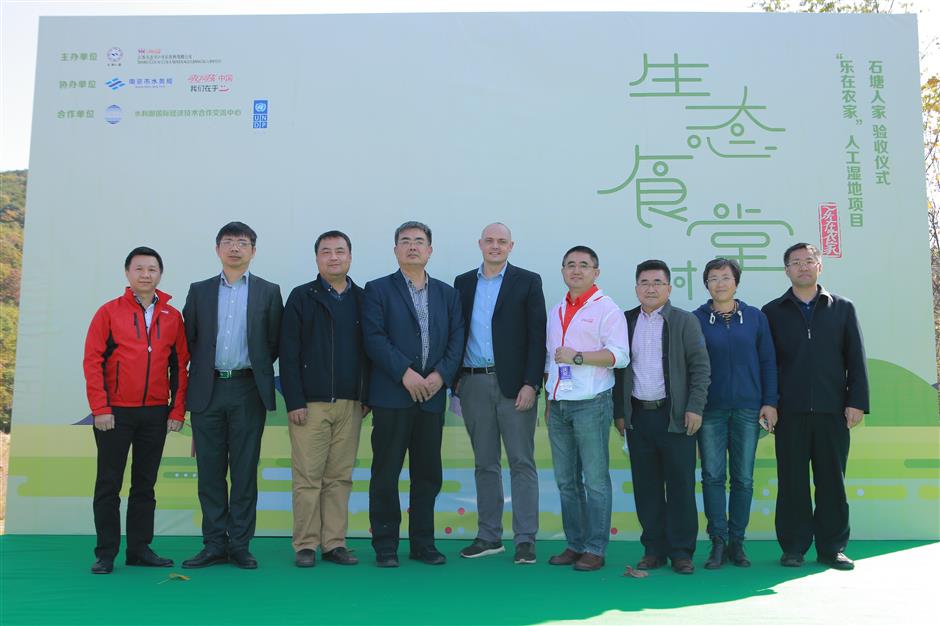Coca-Cola's innovative project deepens its water commitment

Happy Farmland Project brings brightness and spirit to Shitang Village.
Coca-Cola’s Happy Farmland Project, which uses artificial wetland to process sewage in Shitang Village, Jiangsu Province has officially passed final inspection and been accepted by Nanjing Water Affairs Bureau.
It is the latest showcase of the global beverage company’s long-term commitment to sustainable development in China.
As the first Coca-Cola Happy Farmland Project in Jiangsu Province, the Shitang Village project was officially launched in December last year. In the Jiangning District in Nanjing, Shitang covers 5.93 square kilometers.
There are over two million farmhouses in China and a huge inflow of tourists from urban areas not only generating income for farmers, but also discharging waste water and domestic sewage into the rivers.
At Shitang village, during peak time, there are more than 20,000 visitors day, and it brings environmental problems as owners of the farmlands have little knowledge of how to deal with waste water.
Coca-Cola, joining hands with the Ministry of Commerce International Center for Economic and Technical Exchanges and the United Nation’s Development Program, worked with environmental experts and water protection specialists to adopt eco-wetland technology which takes full advantage of the soil ecosystem in the local area to break down pollutants in sewage by physical, chemical, biological processes.
Zhang Jiantao, Vice President of Coca- Cola China and South Korea, said:
“We’re happy that Coca-Cola’s first Happy Farmland project in Jiangsu Province has passed the final inspection, and it’s a fruitful result which was brought together by the Golden Triangle mode that involves cooperation with government, civil society and businesses.”
“As one of the most important strategies of our sustainable development initiatives, we have built nearly 20 water stewardship programs in China and Happy Farmland is one of the bright spots.
“This all originates from our corporate value — ‘We are here, and we care’.”
These programs have also played a positive role in improving water use efficiency and the local ecosystems and promoting national policies relevant to water conservation.

Partners witnessed the final inspection of Coca-Cola’s first Happy Farmland Project in Jiangsu Province.
At first, local residents also didn’t understand or believe how wastewater could be treated by the flowers and grass that were planted.
The Happy Farmland Project utilizes these plants and their roots to absorb and decompose organic matter, nitrogen and phosphorus, which can treat 180 tons of wastewater per day and improves the water quality to level B.
All the wastewater from Shitang’s farmhouses is discharged into the mini-wetland. With this water-improving system, it has increased the sustainability for a larger number of tourists without breaking the ecological equilibrium.
The 19th National Congress of the Communist Party of China last month also highlighted the importance of the rural revitalization strategy, and building an ecologically beneficial new landscape has been the starting point for Coa-Cola and its partners to jointly promote the Happy Farmland program.
“The Happy Farmland program truly achieved wastewater purification and at the same time also helped to improve the local environment,” said Zhang Ning, a director at the Ministry of Commerce China International Center for Economic and Technical Exchanges.
Niels Knudsen, Policy Specialist and Team Leader of South-South Policy at the United Nations Development Program, said that replenishing and ensuring clean drinking water in rural areas has always been a priorities in preserving water resources in China.
“Collaboration between government, civil society and businesses will play a very active role in achieving the United Nation’s 2030 Agenda for Sustainable Development,” he said.
Jin Hai, a director at the International Economic and Technical Exchange and Cooperation Center at the Ministry of Water Resources said:
“We greatly appreciate the innovation, efficiency and the scalability of Coca-Cola’s Happy Farmland project for water purification and this also provides new thinking for neighboring areas on wastewater management.
“Caring for people who live here, their livelihood and their families are the priorities for truly building a long-term development here and Coca-Cola has been always sticking to that core value.”
In 2015, Coca-Cola became the world’s first Fortune 500 Company to achieve the goal of 100 percent water replenishment.















